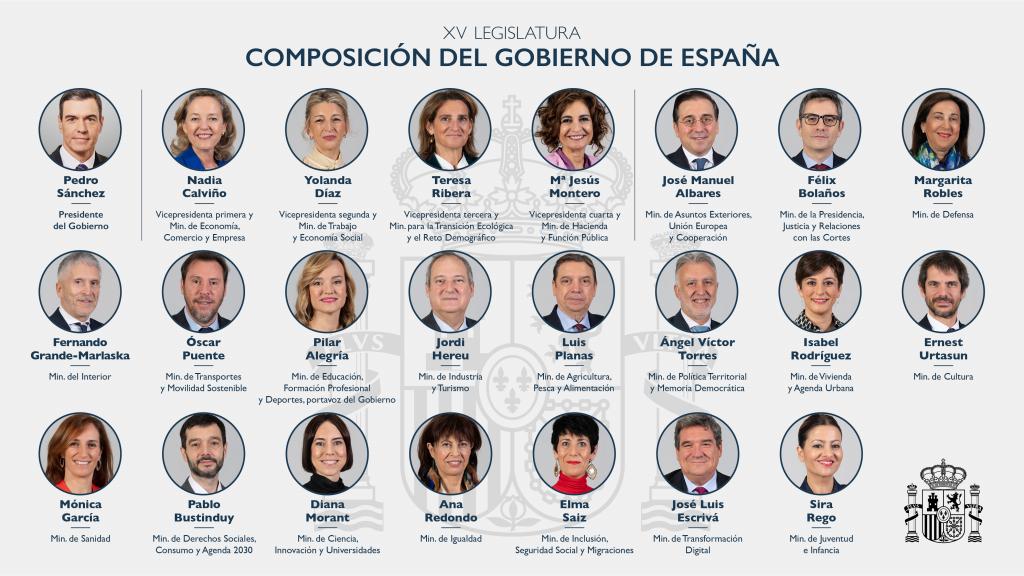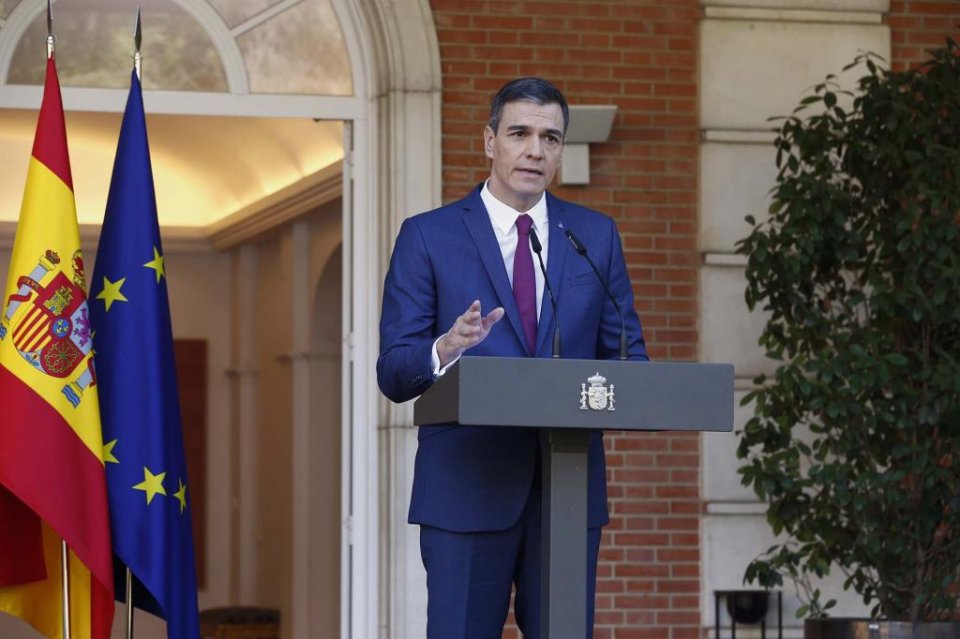Recently re-elected socialist Prime Minister Pedro Sánchez announced his new Spanish cabinet on Monday, and which excludes any ministerial posts for members of his previous left-wing coalition partner, the Podemos party – although a former member of that party will hold a post. ALSO READ: Pedro Sánchez re-elected as Spanish Prime Minister.
Sánchez kept his top ministers unchanged in the new cabinet, although the new coalition partner Sumar – the alliance of left-wing parties that officially includes Podemos and is now led by Labour Minister Yolanda Díaz – sought to assert itself with four ministerial appointments. ALSO READ: Podemos and 14 other left-wing groups will run in election with Díaz’s Sumar.
The revamped cabinet is a group ‘with high political profiles’, with a majority of female members and a strong focus on women’s rights, Sánchez said in a speech on Monday. It is a 22-member cabinet with 12 women and 10 men, and with women holding all four deputy prime minister posts (Nadia Calviño, Yolanda Díaz and Teresa Ribera who are also the ministers of Economy, Labour and Ecological Transition respectively – while María Jesús Montero remains as Finance Minister and will assume the position of fourth deputy PM).
‘The new government is going to have a marked feminist accent with four women deputy prime ministers and more female ministers than male ministers,’ Sánchez said. His PSOE party will hold 17 ministries and Sumar five.
His socialist party, alongside Sumar, will face a strengthened opposition, led by the right-wing People’s Party (PP), which controls most of Spain’s regions and large cities, as well as the Senate, and has 171 seats in the 350-member parliament. ALSO READ: Pedro Sánchez faces backlash and tough legislature ahead due to Catalan deal.
The core group of cabinet posts — known as ‘state ministries’ in Spain — remains mostly unchanged, with the ministers of foreign affairs (José Manuel Albares), interior (Fernando Grande-Marlaska) and defence (Margarita Robles) staying on. Economy Minister Nadia Calviño also keeps her role for now as she bids to become president of the European Investment Bank. Sánchez will only replace her if she gets the job in the coming weeks.
The biggest changes come from Díaz, who has appointed four ministers to work alongside her. She originally joined the cabinet in 2020 with then partner Podemos. ALSO READ: Pablo Iglesias, founder of the left-wing Podemos group, quits politics.
While Sánchez has sought to limit his junior coalition party’s power by giving it less important ministries, it has proved capable of outsize influence. Sexual consent legislation and a law on trans rights, both sponsored by outgoing left-wing Equality Minister Irene Montero of Podemos, ended up becoming highly controversial and played a significant part in elections this year. Montero’s role at the Equality Ministry is being taken on by Ana Redondo of the PSOE. ALSO READ: Pedro Sánchez apologises to victims over government’s rape law loophole.
Ione Belarra, the current leader of Podemos who recently called on the acting coalition government to petition the International Criminal Court (ICC) to open a war crimes investigation into Israeli Prime Minister Benjamin Netanyahu, is also not continuing in the ministerial post for social rights. Her role is now taken by Pablo Bustinduy, who was a former member of Podemos. ALSO READ: Spanish minister says Israel’s Netanyahu should be investigated for war crimes.
Here are the other main changes in Sanchez’s government:
- Industry: Jordi Hereu, former socilaist mayor of Barcelona will oversee policy linked to European recovery funds.
- Transport: Óscar Puente, former socialist mayor of the city of Valladolid, is expected to be a key spokesman for the government.
- Regional policy: Angel Torres, a former president of the Canary Islands, will manage relations with the regional presidents, most of whom belong to the opposition.
- Digital Transformation: José Luis Escrivá, one of Sanchez’s main economic advisers who headed social security until now, will take over a new ministry that includes some briefs previously under the Economy Ministry.
- Justice: Félix Bolaños, who is one of Sánchez’s closest allies, will continue as presidency minister and adds the Ministry of Justice to his portfolio, a key role for the new government due to the amnesty law for the pro-independence movement. ALSO READ: Amnesty bill registered in Spanish Congress – full details.
- Health: Mónica García, a doctor and member of Sumar.
- Culture: Ernest Urtasun, Sumar’s spokesman.
- The other two ministerial posts for Sumar are Sira Rego in Childhood and Youth, and Pablo Bustinduy (former Podemos member) as Minister for Social Rights.
- The Minister of Education, Pilar Alegría, will also be the government’s spokesperson.
Here is the full official list (PSOE, if not stated).
- First Deputy PM and Minister of Economy, Commerce and Business, Nadia Calviño.
- Second Deputy PM and Minister of Labour and Social Economy, Yolanda Díaz (Sumar).
- Third Deputy PM and Minister for Ecological Transition and the Demographic Challenge, Teresa Ribera.
- Fourth Deputy PM and Minister of Finance and Public Function, María Jesús Montero.
- Minister of Foreign Affairs, European Union and Cooperation, José Manuel Albares.
- Minister of the Presidency, Justice and Relations with the Congress, Félix Bolaños.
- Minister of Defence, Margarita Robles.
- Minister of Interior, Fernando Grande-Marlaska.
- Minister of Transport and Sustainable Mobility, Óscar Puente.
- Minister of Housing and Urban Agenda, Isabel Rodríguez.
- Minister of Education, Vocational Training and Sports; and cabinet spokesperson, Pilar Alegría.
- Minister of Industry and Tourism, Jordi Hereu.
- Minister of Agriculture, Fisheries and Food, Luis Planas.
- Minister of Territorial Policy and Democratic Memory, Ángel Víctor Torres.
- Minister of Culture, Ernest Urtasun (En Comú Podem/Sumar).
- Minister of Health, Mónica García (Más Madrid/Sumar).
- Minister of Social Rights, Consumption and Agenda 2030, Pablo Bustinduy (Sumar).
- Minister of Science, Innovation and Universities, Diana Morant.
- Minister of Equality, Ana Redondo.
- Minister of Inclusion, Social Security and Migration, Elma Saiz.
- Minister of Digital Transformation, José Luis Escrivá.
- Minister of Youth and Children, Sira Rego (IU/Sumar).

Hoy España está más fuerte que hace cinco años.
— Pedro Sánchez (@sanchezcastejon) November 20, 2023
No nos conformamos.
Os presento un Gobierno feminista, sólido y solvente para que España siga avanzando cuatro años más.
Mi gratitud a las ministras y ministros que dejarán de formar parte del Gobierno de España. pic.twitter.com/qdTGEnxIQb
Sign up for the FREE Weekly Newsletter from Spain in English.
Please support Spain in English with a donation.
Click here to get your business activity or services listed on our DIRECTORY.
Click here for further details on how to ADVERTISE with us.


